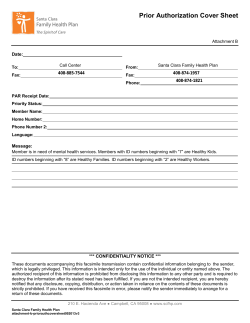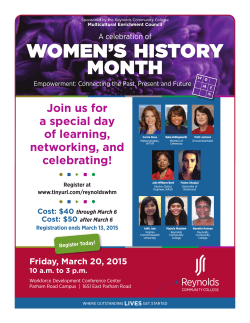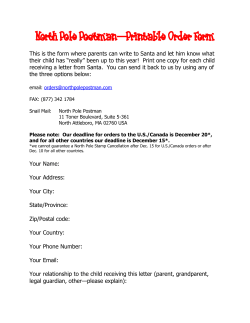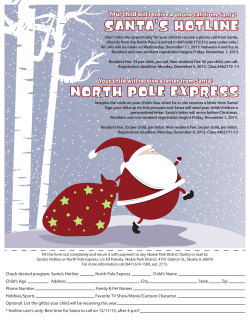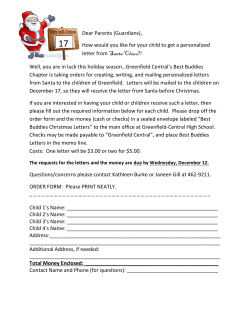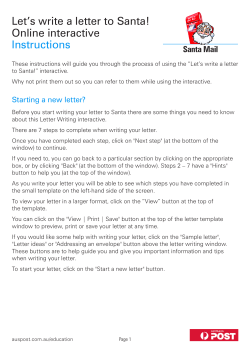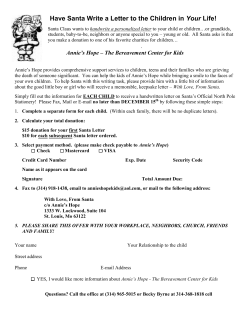
Basic instructions on how to begin your family tree research
Basic instructions on how to begin your family tree research by Stephanie Reynolds American Indian / Alaskan Native Patient Relations Indian Health Center of Santa Clara Valley May 2014 Lets start this family project Where to start? Learn how to research your family history Start by picking up that pen and paper You can also record or video tape your stories and pictures … So let’s get started Let’s get together as a family and put your stories and pictures to good use by beginning your research. Your journey into the past will be a fascinating find, You will become the family historian or a great story teller. Time to journey in the past; Lets find out about your history. Ancestor charts provide an overview of the family and enable you to track your research project. Ancestor charts ask these questions Name: First and Last (Maiden Name) _______________________________ B: Birth Date: 12/16/1964 P: Place Location: Rosebud, SD M: Married 06/15/2005 P: Place Santa Cruz, CA D: Death Add Date P: Place Add Location _______________________________ Add a picture if you can A memo or note; who this person is and how they are related to you. (Auntie) (2nd Cousin) (Great – Great - Grandmother) (Who did they married?) Start with your own family Family History is More Than Dates Your family history includes more than names and dates. Ask about life stories. Example: •Do they remember relatives and friends? •When you where 20 or 30 years old where did you live? •What places have you seen? You should ask if you can record the interview. Remember to write down notes. Questions that may help your interview are: Choose a question of your own to begin your research project; Decide what you want to learn… Example: Who is Native American in my family? Choose questions focused on your project: 1. When and where they were born? 2. Where did they live? 3. Did they marry someone? 4. When and where were they married? 5. Who did they marry? 6. Did they have children? 7. When and where did they die? 8. Where are they buried? Look for Home Sources After you have filled in the ancestor chart as completely as you can, look at home records that may give additional information. Look for items such as: Allotment Certificates Newspapers obituaries Memorial cards from funerals Family Bibles Diaries Photos Church records School Records Medical Records Military Records Documents such as birth, marriage, and death certificates These can all provide more names, places and specific dates – important clues for the next steps in your research. Next, time to travel and seek outside help… Some librarians specialize in family history research. They are available to help. A completed ancestor chart will help them to better assist you. (Make it as complete as you can .) Visit a Genealogy Library – In person or Online Our local one is Central Park Library 2635 Homestead Road Santa Clara, CA 95051 Phone: 1-408-615-2930 Search sources, such as: Census, vital records, directories, newspapers, microfilms, computers, and local histories All of these together act as tools in your research. The National Archives holds information about American Indians who maintained their ties to Federally-recognized Tribes (1830-1970). Most records are arranged by tribe. National Archives in Washington, DC 700 Pennsylvania Avenue, NW, Washington, DC 20408 Telephone: 202-357-5000 Customer Service Center Telephone: 1-866-325-7208 Share your research and have fun! Compile your work in a book or on a CD to share with your family, and give copies to libraries. Offer your work to its collection. Doing family history research can be a rewarding, lifelong pastime, taking you to new places, introducing you to new family members, and giving you a deeper appreciation of your unique heritage. Find out about your past, share it with current family members, and record it for future generations. It all starts when you take a look behind you! To all my relations Stephanie Reynolds, CEC AI/AN Patient Relations 1333 Meridian Ave., Bldg - C San Jose, CA 95125 Phone: (408) 445-3400 ext:287 sreynolds@ihcscv.org The End
© Copyright 2025


